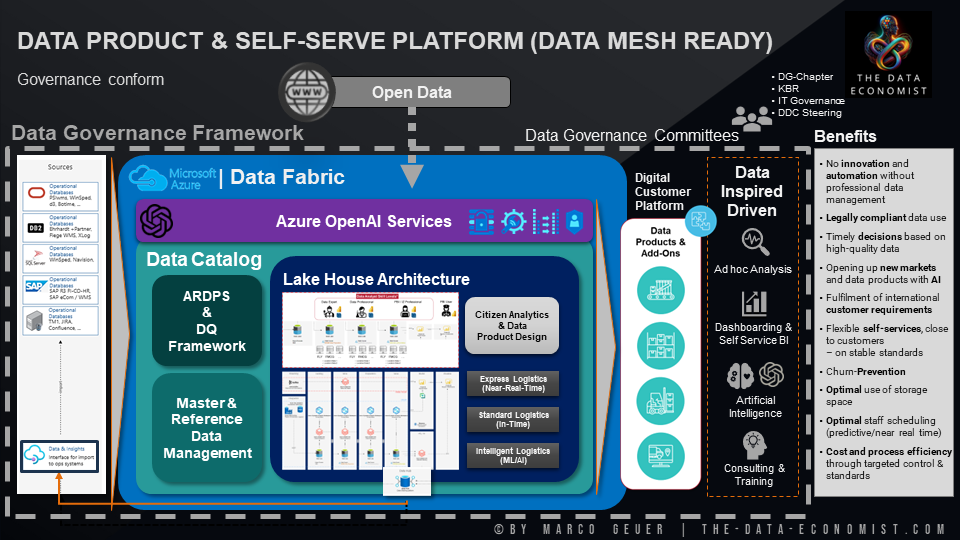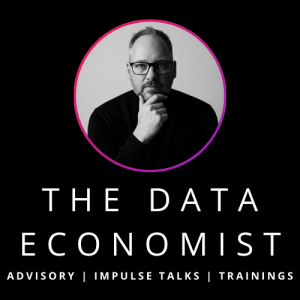How to build a data mesh ready platform
Why a data governance-oriented data fabric is essential for scalable qualitative Data & AI Products
Modern process approaches, agile working, cloud technologies and AI offer new opportunities
In our data-driven world, qualitative data products are key to business success. But scaling such products efficiently requires a robust data infrastructure. This is where the data fabric comes in. A successively (agilely) built, data governance-oriented data fabric ensures that data quality, protection and use are at the centre of all efforts.
Agile approach
An agile structure of a data fabric enables companies to react flexibly to changes in the data ecosystem and to quickly implement innovative solutions. Prioritising by use cases with high economic value ensures that the projects that bring the greatest benefit to the business are implemented first. This not only promotes competitiveness, but also optimises the use of resources. It also enables continuous adaptation to market needs and developments. Such an approach also ensures greater alignment of the data strategy with business objectives.
Cloud technologies
Building a data fabric in the cloud enables seamless data integration across different sources and platforms. This leads to increased agility and scalability, as companies can react quickly to changes and adapt resources dynamically. Furthermore, companies benefit from cost savings by using cloud resources instead of expensive on-premise infrastructures. In addition, a cloud-based data fabric also promotes the ability to innovate, as new technologies and services can be easily integrated, enabling, for example, retrospective, (near)-real-time and predictive analytics to be used in parallel or even complementarily. The advancing use of generative AI also makes it increasingly possible to shift the ability to analyse and make decisions based on data back into the business (citizen analytics).
Building blocks for a governance-oriented data fabric
A governance-oriented data fabric should contain the following building blocks. The building blocks are interconnected in such a way that they enable a structured, quality-assured production of data products.
Data Quality Framework: Data quality is the foundation of every data decision. Without a solid data quality framework, companies cannot ensure that their data is accurate, up-to-date and relevant. Through systematic quality controls, validation mechanisms and continuous monitoring, errors can be detected and corrected at an early stage, which in turn strengthens trust in data products.
Master data and reference data management: Master data are the main data sources of a company and are essential for operational and strategic business operations. Effective management of this data ensures consistency and integrity, avoiding redundant data sources and optimising business processes.
Data Protection: In times of the General Data Protection Regulation (GDPR) and other regulatory requirements, the protection of personal data is essential. Data protection built into the Data Fabric ensures that all data products comply with applicable laws and regulations, minimising the risk of penalties and increasing customer and stakeholder confidence.
Data Catalog: In an increasingly complex data ecosystem, a Data Catalog can help keep track of everything. It provides a central overview of all available data sources, their origin and use. This promotes transparency and facilitates data integration and use.
Artificial Intelligence (AI): AI technologies can help analyse data, identify patterns and provide valuable insights. Integrated AI in the data fabric enables automated data processes, predictive analytics and personalised data products.
Self-service/citizen analytics for business: To be agile and data-driven, business users need to be able to analyse data on their own. A self-service approach in the data fabric enables them to access relevant data and draw insights from it without IT support.
In summary, an iteratively built, data governance-oriented data fabric is essential to ensure scalable, quality data & AI products. The integration of building blocks such as a data quality framework, master data management and AI ensures that data is not only of high quality, but also secure, transparent and usable. This enables companies to make data-driven decisions, drive innovation and compete in today's data-driven economy.

More articles on related topics:
Data Strategy, Artificial Intelligence, Data Products, Data Mesh, AI, Data Fabric, Data Product, Data Analytics Platform, Data Business Value Driven, Data Driven, Self Service BI, AI Strategy, Data & AI Strategy, Self Service AI, AI Products
- Geändert am .
- Aufrufe: 4077
